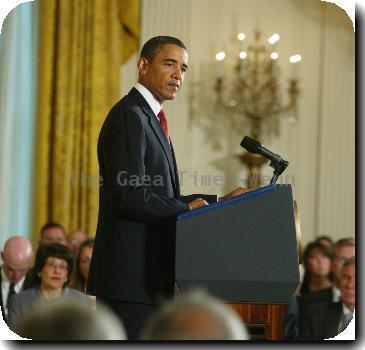US envoy says NKorea must address previously secret nuclear program in disarmament talks
By APWednesday, December 16, 2009
US says NKorea must address uranium program
WASHINGTON — President Barack Obama’s special representative for North Korea said Wednesday that any future nuclear disarmament talks will have to deal with an atomic program the North has only recently revealed.
Stephen Bosworth, just returned from the Obama administration’s first high-level talks with North Korea, told reporters at the State Department that the North’s uranium enrichment program, which gives the country a second way to make atomic bombs, will “clearly be on the agenda” when the stalled disarmament negotiations resume.
“They put it there,” he said of the North, by publicly announcing they had finished the first experimental phase of a such a program.
The six-nation disarmament talks, which Bosworth was trying to restart during his trip to the capital, Pyongyang, have focused on the North Korea’s plutonium production. But uranium has always lingered as a point of contention. The current nuclear crisis with North Korea began in 2002 when the Bush administration said the North admitted to a secret uranium program during U.S.-North Korean talks in Pyongyang.
In an attempt to bring the North back to talks, Bosworth brought to Pyongyang a letter from Obama to North Korean leader Kim Jong Il, the State Department said. Neither Bosworth nor the State Department spokesman would talk about the letter’s contents, but Bosworth said he brought no message from Kim when he returned to Washington.
“I was the message,” Bosworth said of his visit. “I was conveying very directly to the North Korean leadership a vision for the future which would be a lot different than the present or the past,” provided the North starts abandoning its nuclear programs.
Bosworth also said he urged the North not to conduct a third nuclear test. The U.N. Security Council tightened sanctions in June in response to North Korea’s second underground nuclear test. The sanctions ban the country from developing its nuclear program and selling conventional arms.
Bosworth said the North lobbied to have those sanctions eased, something he said wouldn’t happen until North Korea came back to nuclear negotiations and made significant progress on getting rid of its atomic weapons.
Both Washington and Pyongyang agreed during Bosworth’s trip on the need to resume the stalled talks, but North Korea did not make a firm commitment on when it would rejoin the negotiations. Bosworth said Wednesday that he did not know when those talks might begin.
In what was seen as a breakthrough at the time, North Korea promised in 2005 to begin abandoning its nuclear programs in return for aid and political concessions. But the talks have deadlocked since. Pyongyang walked away from the negotiations this year in anger over the sanctions.
Meanwhile, Thai authorities are inspecting 35 tons of weapons seized from a cargo plane loaded in North Korea — the latest known case of Pyongyang’s illicit weapons trade in violation of U.N. sanctions.
North Korea is believed to earn hundreds of millions of dollars every year by selling missiles, missile parts and other weapons to countries such as Iran, Syria and Myanmar.
Bosworth would only say that the Thai seizure shows that sanctions against the North are working.
Tags: Asia, Barack Obama, East Asia, Foreign Policy, North America, North Korea, North korean, Pyongyang, United States, Washington, Weapons Administration



